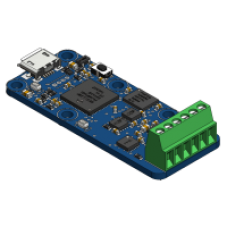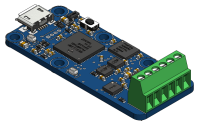 This device is a USB to SPI interface (master mode). It can handle the 4 standard SPI modes, and both bit encoding directions. It does not require a driver and does not install a virtual COM port.
This device is a USB to SPI interface (master mode). It can handle the 4 standard SPI modes, and both bit encoding directions. It does not require a driver and does not install a virtual COM port.
It can autonomously interpret data coming from any external SPI board and expose measures as if they were coming from a Yoctopuce sensor, with all the inherent advantages: unique identifier, polling, callbacks, data logger. Note that this device does not work with applications designed to use a COM port, it is designed to be used with Yoctopuce API only.
The device can also analyze a bidirectional SPIcommunication between two tiers without interference (listening two both directions simultaneously).
If needed, the device can also provide a 3.3V or 5V voltage source to power the external serial board. The 3.3V source can provide up to 200mA. The voltage used for SPI signals can be selected independently of the source voltage.
This device can be connected directly to an Ethernet network using a YoctoHub-Ethernet, to a WiFi network using a YoctoHub-Wireless-n and to a GSM network using a YoctoHub-GSM.
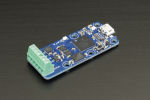 |
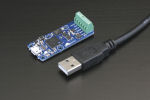 |
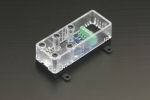 |
USB cables and enclosures to be ordered separately.
Specifications
Product ID:YSPIMK01Product name:Yocto-SPI
USB connector:micro-B
Width:20mm
Length:48mm
Weight:6g
Max frequency:4Mbit/s
Protection class, according to IEC 61140:class III
Normal operating temperature:5...40Ѓ
Extended operating temperature1:-30...85Ѓ
Supported Operating Systems:Windows (PC + IoT), Linux (Intel + ARM), macOS, Android
Drivers:Driverless, no driver needed
API / SDK / Libraries:C++ Obj-C C# VB.NET UWP Delphi Python Java Android LabVIEW
API / SDK / Libraries (TCP only):Javascript Node.js PHP
RoHS compliance:RoHS III (2011/65/UE+2015/863)
Suggested enclosure:YoctoBox-Long-Thick-Black
Harmonized tariff code:9032.9000
Made in:Switzerland
1 The extended temperature range is defined based on components specifications and has been tested during a limited duration (1h). When using the device in harsh environments for a long period of time, we strongly advise to run extensive tests before going to production.

